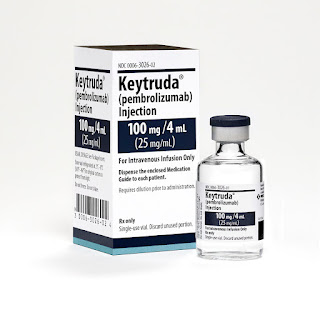Prostate Cancer Treatment: Surgery vs. Radiation
EU Approves Merck's Keytruda, Chemo Combo For Lung Cancer
Pictured: Merck building and sign in Silicon Valley/iStock, Sundry Photography
Merck announced Thursday that the European Commission has approved the use of its anti-PD-1 therapy Keytruda, in combination with platinum-containing chemotherapy, for resectable non-small cell lung cancer first as a neoadjuvant treatment and then continued as a monotherapy afterwards.
The therapy already has half a dozen indications in non-small cell lung cancer (NSCLC). The new expansion applies to resectable NSCLC at high risk of recurrence in adults. According to Merck, the EC's decision "marks the first approval in Europe for an anti-PD-1/L1 therapy in resectable NSCLC based on positive overall survival results and represents the sixth approval for Keytruda in lung cancer in Europe."
Europe's regulator gave the green light following the results of the Phase III KEYNOTE-671 trial. At just under 30 months follow up, the regimen significantly improved overall survival, reducing the risk of death by 28%, regardless of PD-L1 status. Patients treated also showed improved event-free survival, with a 41% reduction in risk of disease recurrence, progression or death.
Despite advancements, lung cancer continues to carry the world's highest mortality rate and accounting for around one in five cancer deaths in the U.S. Thursday's announcement makes it the sixth lung cancer indication added by the EC for Keytruda, with 27 indications overall in Europe. The U.S. Approved the same use, specifying tumor size of greater than or equal to four centimeters or node positive in October 2023.
Thursday's approval allows for Merck's marketing of the Keytruda regimen for the indication in all 27 EU member states, as well as Iceland, Liechtenstein, Norway and Northern Ireland.
Keytruda generated $25 billion in sales in 2023 for Merck. The cancer drug is forecast to top $30 billion in sales by 2026. However, Keytruda is facing a looming patent cliff at the end of the decade.
To help mitigate the effects, Merck is trying to bolster its oncology platform by working on combined immunotherapy approaches to supercharge its targeted therapies and continuing studies to expand Keytruda further before the patent expiration.
"We are eager to build on this momentum as we plan to seek additional approvals of this regimen around the world," Marjorie Green, head of oncology for Merck Research Laboratories.
Kate Goodwin is a freelance life science writer based in Des Moines, Iowa. She can be reached at kate.Goodwin@biospace.Com and on LinkedIn.
First Patient Dosed In Trial Of Plinabulin, Keytruda And Chemo In SCLC
Dendritic cell maturation agent plinabulin, immunotherapy and chemotherapy are being studied in first-line extensive-stage small cell lung cancer.
Researchers will investigate the triple IO combination in patients with extensive-stage small cell lung cancer.
The first patient was dosed in a phase 2 study of plinabulin and Keytruda (pembrolizumab) plus etoposide/platinum chemotherapy (EP). The study is examining the combination in frontline extensive-stage small cell lung cancer (ES-SCLC), according to an announcement from BeyondSpring, the manufacturer of plinabulin.
The trial — which has an estimated enrollment of 45 patients — will be completed around December 2025, per its clinicaltrials.Gov listing.
BeyondSpring announced last year that it kicked off a trial investigating plinabulin and Keytruda with docetaxel. The treatment combination treated patients with previously treated non-small cell lung cancer whose disease worsened after immunotherapy with or without platinum doublet chemotherapy. That study is estimated to be completed by the end of 2025, according to clinicaltrials.Gov.
We are pleased to start this second [investigator-initiated] study with [Keytruda manufacturer] Merck. … We believe in the collateral sensitivity and efficacy potential of this triple IO combination in both front and later lines of cancer treatment. Plinabulin's unique DC maturation mechanism may pose to be the 'bridge' between tumor neo-antigen generation from chemotherapy, and T cell action enabled by PD-1 antibodies. Potential improvements in both duration-of-response and quality-of-life could translate into overall survival benefit. Every moment of a cancer patient's life is valuable, and our primary goal is to discover innovative treatment strategies that prolong their lives," stated Dr. Lan Huang, co-founder, chairman and CEO of BeyondSpring, in the company's recent announcement.
LEARN MORE: Keytruda Meets Trial Goals for Non-Small Cell Lung Cancer Treatment
The current standard treatment for first-line ES-SCLC includes EP and EP plus PD-L1 antibodies, with an objective response rate (percentage of patients whose disease responds partially or completely to treatment) of 60% to 65%, according to BeyondSpring. Additionally, the median overall survival (time patients lives following treatment, regardless of disease status) was 10 to 13 months.
Researchers at the Wuhan Union Hospital in China will evaluate the efficacy and safety of plinabulin, described by BeyondSpring as "a potent dendritic cell (DC) maturation agent," in combination with the immunotherapy Keytruda plus EP. The study will also evaluate primary research endpoint of the 12-month progression-free survival (PFS) rate, or the percentage of patients whose disease has not spread or worsened a year after treatment.
Every three weeks, patients will receive intravenous Keytruda on Day 1, intravenous etoposide on Days 1, 2 and 3, intravenous carboplatin or cisplatin on Day 1 and intravenous plinabulin on Day 1, according to the news release.
LEARN MORE: For Patients With Small Cell Lung Cancer, It's a Time to Be Hopeful
"Although the current therapies in first-line ES-SCLC, including PD-L1 antibody and EP combination have had a high ORR, the duration of response is still short with median PFS of [less than] 6 months. … Adding plinabulin, a potent DC maturation agent, to [Keytruda] plus EP, could potentially enable a durable response and improve PFS. This combination study represents an important step forward to address this unmet medical need. I am eager to evaluate this treatment in clinical settings, ensuring that cutting-edge, advanced therapies are translated to cancer care worldwide," said Dr. Xiaorong Dong, principal investigator for the study, in the news release.
For more news on cancer updates, research and education, don't forget to subscribe to CURE®'s newsletters here.




Comments
Post a Comment